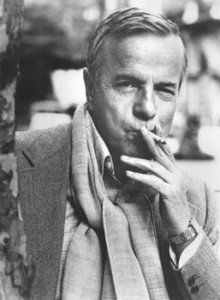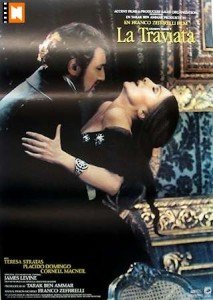Zeffirelli… A film review – La Traviata
2014 január 11. | Szerző: Illés Erika |
Az új évben már lázasan készülődnek nyelvvizsgára ifjak és még ifjabbak. Több vizsgán is szerepel valamilyen alkotásnak az értékelése. Ez mind a középfokú, mind a felsőfokú vizsgákra érvényes. Véleményem szerint a téma hálás, hiszen olvasunk jó könyveket, vannak filmes élményeink, és akár a balett is lehet valakinek kedvence. Arról írni, amit szeretünk, nem is olyan rossz dolog – különösen a nyelvi megmérettetésen. Az egyik kedvencem, Zeffirelli filmjéről írtam. Inkább a haladó nyelvtanulók ajánlanám, nehogy elrettentsem a középfokra még csak hőn áhító olvasót…
This review is intended for my advanced readers.

My favourite film was an opera-film directed by Franco Zeffirelli, the cast was marvellous.
The story of the film was based on the play of A. Dumas j.r., La Dame aux Camellias. The scene is set in Paris in the middle of the 19th century. Teresa Stratas was Violetta and Placido Domingo was Alfredo.
Musically, Giuseppe Verdi’s opera La Traviata begins at the end and so does Zeffirelli’s film. The attenuated strains of the prelude show not the highest spirits of the heroine, but the lonely last-act gasps of a woman dying of consumption. After this threatening silence, suddenly there is a blast of trumpets and the scene is abruptly transformed with a flashback to a glittering party. As the music gathers force, so does the action: magnificent chandeliers are reflected in a thousand champagne glasses. Enters Violetta, laughing. But the last word must be inevitably tragedy.

Yet film as a medium has had difficulties in portraying all the complexity of the grand operas.
This film is visually stunning and musically thrilling; I think it is the finest operatic movie yet made. It should appeal to even those who have resolutely resisted opera’s charm. To tell the truth I am among those people but I have never missed a single one of Zefferelli’s films and I was astonished how he was able to translate opera from stage to screen. The secret is in respecting the musical source but exploiting the film medium’s restless, inquiring mobility.
As both a film maker and experienced opera director, Zeffirelli understands both genres.
In Soprano Stratas and Tenor Domingo he chose two exceptionally convincing singing actors.As Alfredo’s father, veteran Baritone Cornell MacNail is the picture of implacable bourgeois respectability.
The film has headlong vitality and passion. Zeffirelli has captured Verdi’s force in a rare powerful way.
I am not an expert on operatic movies but I am absolutely biased in favour of Zeffirelli. He found the perfect balance in good camera-work, editing, screenplay and music. I saw the film subtitled – but I think in this case it is not really important. If you know the original version – that is the play itself – well, it was not hard to follow the story in spite of there being many flashbacks to the storyline, that had happened earlier.

Other films of Zeffirelli are ‘Romeo and Juliet’, ‘The Champ’ , ‘Endless Love’, and last but not least ”Brother Sun ,Sister Moon”.
Szeretnél hasonló, nyelvvizsgával kapcsolatos feladatokat? Akkor …
iratkozz fel ingyenes nyelvvizsga-tréningünkre ! Itt és most! /Kérlek, a tárgy rovatban jelöld, milyen szintre készülsz!/
Nézz be máskor is!
Üdv,
Erika
U.I.: Ha nem szeretnél már több anyagot kapni, bármikor leiratkozhatsz.






Kommentek
Kommenteléshez kérlek, jelentkezz be: